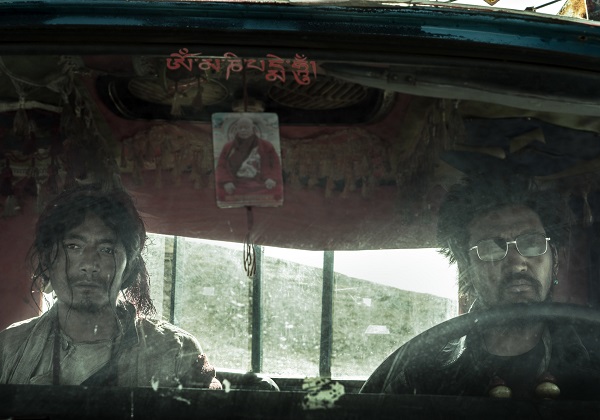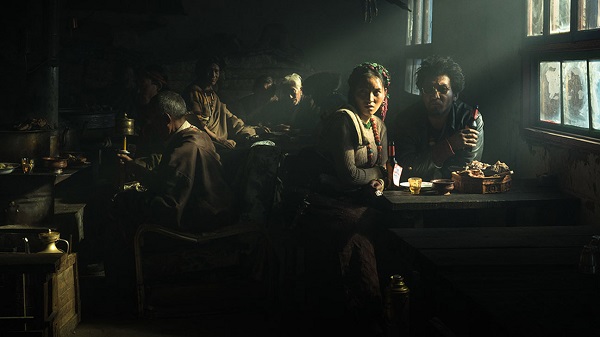
Over the last decade and a half, as scores of world cinema auteurs have achieved festival accolades and cross-border recognition, Pema Tseden has been working away in relative obscurity. Nonetheless, the Tibetan filmmaker and novelist has been crafting subtly powerful allegories about his homeland, a region with no real prior independent film industry to speak of, with all dialogue spoken in its Native language instead of the ever-encroaching Mandarin typically mandated by the Chinese government. Maybe it’s because of the seal of approval his films still obtain from the draconian Chinese censor boards that allow arthouse audiences to write off his work as somehow less dangerous. But that would be a mistake. Like Abbas Kiarostami, who Tseden uses as inspiration in both style and story, he has perfected the art of sly humanist commentary in the face of government oppression.
He’s certainly won a fan in Wong Kar-Wai, who serves as producer on Tseden’s sixth feature, Jinpa, hitting VOD and DVD in North America after winning a screenplay award at Venice back in 2018 (prolific as he is, his seventh feature, Balloon, is currently in the midst of its own festival run). This collaboration has resulted in another huge step forward stylistically for the director after the gorgeous widescreen black-and-white compositions of 2015’s Tharlo – now utilizing an old-school Academy ratio to illustrate the barren beauty of Tibet’s high plains. Yet the thematic and narrative through line continues on from Tseden’s entire body of work, creating a hyper-real interconnected universe of stories and characters representing modern Tibet as it really feels.
In the Tibetan language, Jinpa means “generosity”; and in Tseden’s film, Jinpa is not only the name of the central character, a rough-around-the-edges lorry driver, but also the actor playing him. As Jinpa drives the deserted plain on his way to make a delivery, his truck accidentally runs over a sheep that seemingly appears out of nowhere. Fearing bad luck, he brings the dead animal onboard in order to properly dispose of it but then almost right away comes across a shaggy-looking fellow walking the road alone. Offering him a ride, he finds out that the man is headed to a small village on the way, in order to take revenge on the man who killed his father when he was a child. To push us even further into the hall of mirrors, this passenger’s name also happens to be Jinpa.
Incredulous at first, driver Jinpa drops passenger Jinpa off at his destination and continues on his route. But over the next night and day, he can’t get the mysterious man’s story out of his head. The real and the imagined begin to blur and Jinpa embarks on a quest to go back and find the man to… what exactly? Stop the vengeance from happening? Or stand by and observe? He doesn’t seem quite sure.
Jinpa is perhaps the most illusory of Tseden’s films yet, operating on a lofty existential plane to match the overlooking Himalayas. The longer Jinpa’s quest goes on, the more detached it all becomes, exuding the hypnotic pull of a dream that you’re close to figuring out just as it fades farther away. Tseden often uses his sparse narratives to comment on the Tibetan people’s continued loss of cultural identity and you can see it in the way Jinpa gets increasingly entangled and confused with his psychological doppelganger.
But even with all this heavy philosophizing, Tseden still keeps a deadpan sense of humour in check, alleviating the film from potentially collapsing under the weight of self-seriousness. And as an actor, Jinpa’s performance is perfectly calibrated to this world, playing a lost soul who’s desperately trying to keep his cool façade and stay in control of a situation that keeps spiraling out of it. As Jinpa reaches the end of the line and Tseden hits us with his perplexingly wondrous denouement, capped by a potent final excerpt from a Tibetan proverb, it becomes clear that the viewer has also played an important role. Like any good dream, Jinpa goes beyond mere immersion to become part of our collective unconscious.
With this kind of cinematic assurance, it seems like only a matter of time before Tseden’s reach becomes wider.
- Release Date: 2/21/2020



